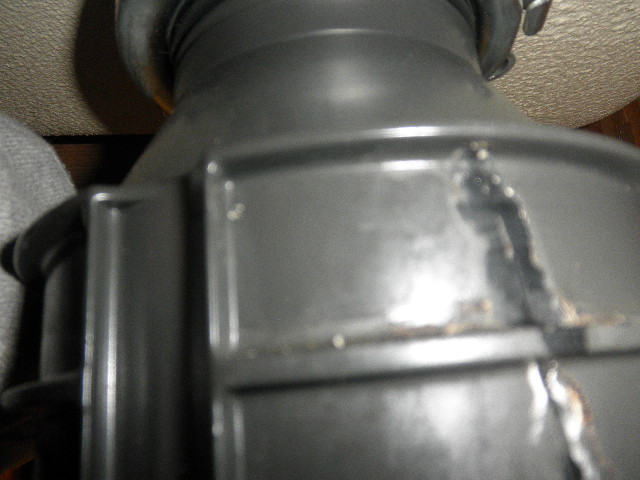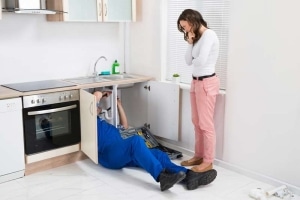Helpful Techniques for Repairing a Dripping Garbage Disposal
Helpful Techniques for Repairing a Dripping Garbage Disposal
Blog Article
Everyone maintains their unique conception with regards to Tips on Fixing a Leaking Garbage Disposal.

Garbage disposals are necessary cooking area appliances that help in taking care of food waste efficiently. However, a leaking garbage disposal can be a discouraging and unpleasant trouble to manage. Thankfully, many leakages can be dealt with easily with a few basic actions. In this short article, we will certainly review just how to fix a dripping waste disposal unit effectively.
Intro
Waste disposal unit are installed under cooking area sinks and are created to shred food waste into smaller sized pieces, permitting it to go through the plumbing system quickly. While these devices are normally reputable, leakages can occur with time due to deterioration, loosened connections, or damages to the device.
Step-by-Step Guide to Taking Care Of a Dripping Garbage Disposal
Shut off the Power
Prior to trying any type of repairs, ensure that the power to the waste disposal unit system is turned off to stop the danger of electric shock.
Situate the Leak
Identify the precise location of the leakage and identify the reason
Tighten Links
Make use of a wrench to tighten up any loose connections between the disposal unit and the plumbing system.
Replace Seals or Gaskets
If the leak is because of worn seals or gaskets, eliminate the old elements and replace them with new ones.
Patching Cracks or Holes
For cracks or holes in the disposal device, usage epoxy or an ideal patching product to seal the damaged area.
Recognizing the Resource of the Leak
Before trying to fix a leaking waste disposal unit, it is important to recognize the resource of the leakage. This can commonly be done via visual inspection or by performing basic tests.
Visual Inspection
Check the garbage disposal device very carefully for any indications of water leakage. Pay attention to areas around seals, gaskets, and link points.
Evaluating for Leakages
One means to test for leakages is by running water via the disposal unit and looking for any kind of visible indications of leak.
Common Reasons For Leakages in Garbage Disposals
Worn Seals and Gaskets
Seals and gaskets play an important duty in preventing water from leaking out of the garbage disposal. Gradually, these parts can wear away, leading to leaks around the disposal unit.
Loose Connections
The connections between the garbage disposal and the plumbing system can become loosened over time, creating water to leakage out throughout procedure.
Fractures or Holes in the Disposal Unit
Physical damage to the waste disposal unit, such as splits or openings in the housing, can also result in leakages.
Devices and Materials Needed for Fixing a Dripping Waste Disposal Unit
Before starting the fixing procedure, gather the essential tools and materials, consisting of a screwdriver, adjustable wrench, plumber's putty, substitute seals or gaskets, and epoxy or patching material for fixing fractures or openings.
Evaluating the Waste Disposal Unit After Repair Service
Once the repair service is complete, check the waste disposal unit by running water with it to make certain that the leakage has been settled.
Preventive Upkeep Tips to Prevent Future Leakages
To prevent future leaks, it is essential to carry out normal upkeep on your garbage disposal. This includes maintaining it tidy, staying clear of putting non-food items or difficult items down the disposal, and occasionally looking for leakages or various other concerns.
Conclusion
In conclusion, repairing a leaking garbage disposal is a relatively straightforward process that can be completed with basic devices and products. By adhering to the actions detailed in this short article and practicing preventive upkeep, you can maintain your garbage disposal in good working condition and stay clear of pricey repair services in the future.
What to Do About a Leaking Garbage Disposal
A leaking garbage disposal often goes unnoticed until you confront a sopping cabinet, a foul-smelling puddle, or an audible drip-drip-drip from the unit. The fix can be frustrating, too, because the leak can stem from a number of components in the system. Fortunately, with a little sleuthing, you can zero in on the leak and—depending on the exact location—stop the icky oozing and repair the component that caused it. Worst case scenario, if it turns out that the garbage disposal must be replaced, installing a new one is a reasonable do-it-yourself task for those with basic plumbing skills. Read on to keep the cash you’d otherwise hand over to a pro.
Prepare to find the leak
Prior to testing the garbage disposal for leaks, unplug it at the wall outlet and turn off the power from the breaker box to prevent electrical shock. Then insert a watertight sink stopper into your sink drain and wipe the unit dry with a clean cloth. In any handy container, mix a few drops of food coloring into a few cups of water, and pour the dyed water onto the sink stopper to help you locate the leak.
Investigate the source
the top, where the disposal meets the sink drain the side, where the dishwasher hose or main drain pipe connects to the disposal or the bottom of the unit Inspect each of these locations while gliding a light-colored rag over the unit; the dyed water will readily show on the rag and reveal the location of the leak. If a leak isn’t immediately apparent, remove the sink stopper and pour a few more cups of dyed water down the sink drain, then check for leaks again. Leaks near the top of the unit are more likely to show themselves while the sink is plugged, while side and bottom leaks are more noticeable while the sink is unplugged.
The metal sink flange that sits directly inside the sink drain is typically sealed around the top with plumber’s putty (a clay-like sealant) and then secured from under the sink with bolts. If the plumber’s putty deteriorates, or the bolts loosen, the flange can no longer form a watertight seal between the sink drain and the disposal—which could cause a leak at the top of the unit.
To reseal the leaky flange, you must first detach the garbage disposal. Start by loosening the screws securing the main drain pipe to the disposal, then loosen the screws in the metal clamp securing the dishwasher hose to the disposal and detach the drain pipe and dishwasher hose from the disposal. Loosen the screws in the mounting ring that connects the disposal to the metal mounting assembly beneath the sink, then pull down the disposal and carefully set it on a clean, dry surface. Loosen the bolts in the mounting assembly with a wrench, then pull down the mounting assembly and set it near the disposal.

We were shown that article on The Handy Guide To Fixing Your Garbage Disposal Leaking through a friend on another web page. Loved our write-up? Please share it. Help others find it. I value reading our article about Garbage Disposal Leaking From Bottom.
Browse Website Report this page